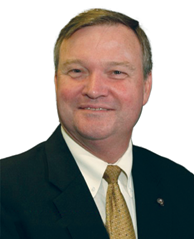
Reflections of TED KIRCHHARR
Former VP and COO for the PEO Division
Not long after I started to work for the company, I recall asking Mr. Landrum on our return from a business trip, ‘How would you sum up your business philosophy?’ His response … I want my customers to have world-class customer service. I want my employees to think ‘this is the best place I’ve ever worked.’ I want to make a reasonable profit.
That’s it. And I thought, WOW…that’s pretty cool. We lived that. That became part of what we used in strategic planning, and when we eventually went to a one-page strategic plan, we captured it in several versions, because that was Mr. Landrum’s philosophy, and the sales guys could talk about that philosophy, ‘This is what we’re trying to do.’ It was about strategic growth, not growth for growth’s sake. It was about getting a little bigger every year and growing a little bit every year. It was about managed growth. That’s what we did.
I think Mr. Landrum’s three-point philosophy on the business is very profound. To me it’s your emphasis on all the right things–employees, clients, and profits. The employees were always aware that Mr. Landrum took the approach of always putting money back into the business. He wasn’t flamboyant with the way he spent money.
I consider Mr. Landrum my mentor. The biggest lesson I took from him is the power of relationships. I watched him make decisions where “relationships” became the overriding factor. That was a huge piece of his decision-making process. It was about the relationships that were involved.
Mr. Landrum’s is a story of how you can apply strong personal beliefs in a business setting. That is what he brought to the table. He would agonize over people decisions–what to do with someone. It was the depth of the anguish he reflected sometimes, because relationships were so important to him. Also, in the final analysis, even if it cost him money, he’s still going to opt for making the right decision when he is ready to make that right decision.
Character is a big piece of it, too. Many of us are really good at teaching tactics and techniques and helping people with visioning and helping people with employee engagement and all of that. But in my opinion, with many companies there is a big hole in the ‘character of leader’ piece. What does the ‘character of a good leader’ look like? What does that mean? How does one make decisions based on a personal set of values? That’s a piece where Mr. Landrum has something to say.
Mr. Landrum is someone whose life is about service to others. It’s about love. It’s about relationships. That’s what his life has been about. That’s the message people need to hear. Everybody needs to hear it. Businesspeople need to hear it, in particular.